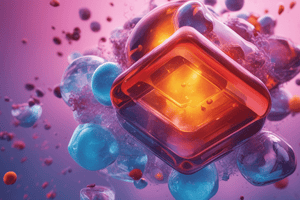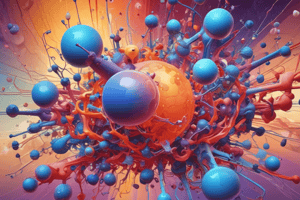Podcast
Questions and Answers
What is characterized by having no fixed shape or volume?
What is characterized by having no fixed shape or volume?
- Solid
- Gas (correct)
- Liquid
- Plasma
What process occurs when a liquid transitions into a solid?
What process occurs when a liquid transitions into a solid?
- Sublimation
- Freezing (correct)
- Condensation
- Evaporation
What do we call the state of matter consisting of ions and free electrons?
What do we call the state of matter consisting of ions and free electrons?
- Solid
- Liquid
- Gas
- Plasma (correct)
Which transition involves a liquid changing to a gas at the surface?
Which transition involves a liquid changing to a gas at the surface?
What describes anything that has mass and takes up space?
What describes anything that has mass and takes up space?
Which of the following is NOT a characteristic of a liquid?
Which of the following is NOT a characteristic of a liquid?
Flashcards are hidden until you start studying
Study Notes
States of Matter and Transitions
- Vaporization: Transition from liquid to gas; can occur via boiling or evaporation.
- Freezing: Transition from liquid to solid; occurs when temperature drops to the freezing point.
- Plasma: Considered the "fourth state of matter"; consists of ionized gas with free electrons.
- Condensation: Transition from gas to liquid; typically occurs when gas cools down and molecules come together.
- Evaporation: Specific type of vaporization that occurs at the surface of a liquid.
Fundamental Concepts
- Matter: Defined as anything that has mass and occupies space.
- Atoms: The tiny, indivisible building blocks of all matter.
- Liquid State: Characterized by a fixed volume, but takes the shape of its container; particles can move freely past each other.
- Gaseous State: Lacks fixed shape or volume; particles move randomly and expand to fill the container.
- Solid State: Has a definite shape and volume; particles are tightly packed and vibrate in place.
Representational Tools
- Models: Simple representations of complex systems, ideas, or processes.
- Scalene Models: Can be smaller or larger, providing simpler representations of the subject being studied.
- Mathematical Equations: Sets of equations that consider various factors to effectively describe a phenomenon.
- Theoretical Frameworks: Integrate multiple ideas, providing explanations for phenomena or events.
Liquid Characteristics
- Examples of Liquid: Understanding which substances do not fit the properties of liquids is essential for categorizing matter appropriately.
Studying That Suits You
Use AI to generate personalized quizzes and flashcards to suit your learning preferences.




